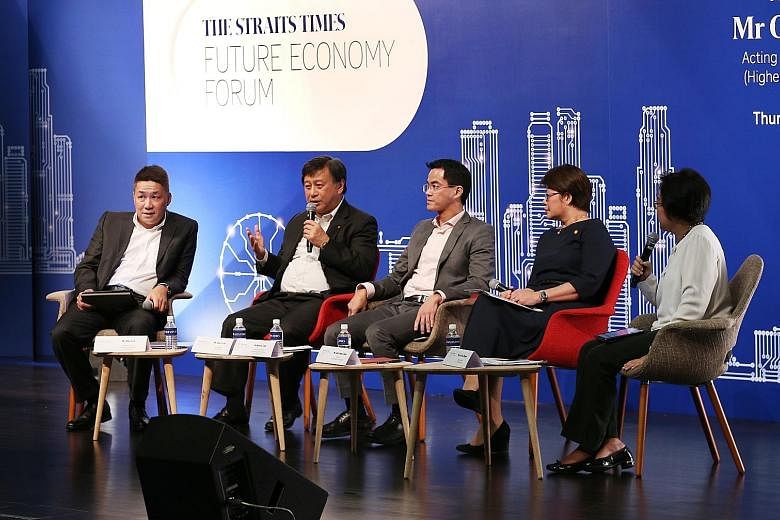Today, diabetic patient Mr Tan will have to make his own appointments to see his doctor, podiatrist and various specialists, and travel to a hospital for each check, which sometimes takes no longer than five minutes.
By 2035, healthcare will go to people like him, said Dr Kelvin Loh, chief executive of Parkway Pantai's Singapore operations division, at The Straits Times Future Economy Forum on Thursday.
"We are not far away from the future where we deliver healthcare to where you are, to where you live," he said. Remote monitoring will send test results directly to a doctor, who will review them and text the patient via WhatsApp or WeChat.
The prescription is sent electronically to the pharmacy, and Mr Tan gets his medicine by Deliveroo.
"We will enter a new era of healthcare," said Dr Loh, one of four business leaders on a panel who presented various scenarios of how Singapore in 2035 would be vastly transformed by technology and innovation.
Diseases like diabetes could be prevented in advance, he added at the panel discussion moderated by ST business editor Lee Su Shyan.
He explained if it can be predicted from the time Mr Tan is born that he will have diabetes, his entire lifestyle can be restructured so that the onset of diabetes can be delayed or even prevented.
Dr Loh noted that such predictive capabilities pose ethical dilemmas: Can employers or insurers ask for genetic information before hiring or setting premiums?
"Regulators, lawmakers and society must keep pace with the changes to find the best balance," he said. Regenerative medicine will enable greying societies like Singapore to unlock the economic potential of the elderly, he said, adding: "The possibilities are enormous."
However, Shell Singapore chairman Goh Swee Chen highlighted the greying tsunami as one of three "hard truths" facing the country, alongside slowing growth and a dwindling population.
She said that evidence shows openness to change declines with age. However, Singaporeans must remain optimistic that challenges of the future can be addressed, she added, noting that time and again, human populations have proven to be resilient due to optimism.
"The optimism must translate into a willingness to become active problem solvers, solution providers, rather than complainers or finger pointers," she said.
Meanwhile, DBS Singapore country head Sim S. Lim said artificial intelligence is likely to be the next big word - closing the gap between man and machine.
Such a merger is not that far away, he said, citing how technology has changed at an exponential rate over the past 25 years, and it is likely to get even more exponential in the next 25 years. Singapore has to not only embrace this change, but also adapt and learn from it, and change with it.
The country's top schools can be linked with what is going on in the world, and create a culture of risk-taking, he added.
"We tend to have this culture where the Government tells us what to do, how to do it and then we do that. That's not going to work," he said. "We have to be more ad hoc, we have to be more agile and we have to adapt much faster. The one request I ask of Government would be not to be bogged down by dogma and rules, and I think the Government is making an effort on that front," he added.
Mr Max Loh, Asean and Singapore managing partner of professional services company EY, said the current reinvention of work by technology is unprecedented and a key question is: Will technology help us to do less or become more?
As Singapore focuses on skills, cross-disciplinary and international exposure, and lifelong learning, mature workers should not feel obsolete as they are needed to share experiences and wisdom, he said.
Wisdom passed on through mentorship becomes more powerful, he added, and this "will make us more insightful and human than robots, and this is where the silver generation plays a large role".


